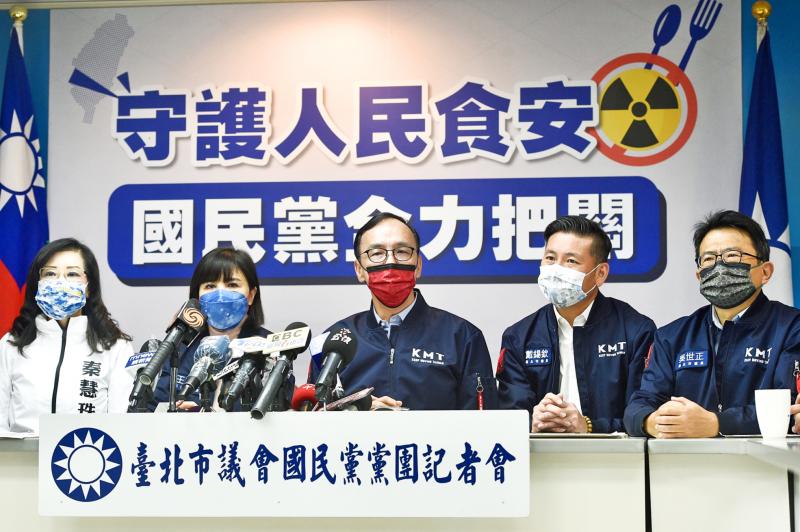Chinese Nationalist Party (KMT) caucuses in 22 cities and counties yesterday jointly declared that they would defend the nation’s food safety, as KMT Chairman Eric Chu (朱立倫) called for changes to the School Health Act (學校衛生法).
President Tsai Ing-wen’s (蔡英文) administration is failing to uphold food safety by lifting a ban on most food imports from five Japanese prefectures implemented after the 2011 Fukushima Dai-ichi nuclear power plant disaster, Chu told a news conference in Taipei.
KMT caucuses held similar news conference across the nation.

Photo: George Tsorng, Taipei Times
The government on Tuesday announced that it would end the ban on Feb. 28.
Ensuring food safety is a basic task of the government, and the KMT has worked to uphold the public’s right to clean and safe food, but the party has been accused of “not loving Taiwan” because it opposes lifting the ban, Chu said.
Local ordinances and the School Health Act should be amended to ban any foods containing residual radiation and prevent children from ingesting such food, he added.
Chu said that although the Democratic Progressive Party has claimed that existing laws are sufficient, Article 23 of the act stipulates that local produce should be prioritized, but does not say it should be the only source of food for schools, which provides a loophole to use food produced from areas affected by the nuclear disaster.
The Executive Yuan saying that local governments cannot implement stricter food safety regulations is the death of autonomous local rule, he said.
Local governments should enact legislation to offer food safety protection in areas where the central government’s laws fall short, Chu said.
Amicable Taiwan-Japan ties should not be a reason to import Japanese goods without question, nor should the government cite its application to join the Comprehensive and Progressive Agreement for Trans-Pacific Partnership as a reason to end the ban, he said.
Chu said that he had discussed the issue at length with New Taipei City Mayor Hou You-yi (侯友宜), who alongside other county and city KMT leaders agreed that taking a stand against the government’s Japan import policy was necessary.
Premier Su Tseng-chang (蘇貞昌) yesterday said that the School Health Act prioritizes the use of local produce not only because it allows children to recognize what is grown locally, but also because Taiwanese produce is fresh and of better quality.
Taiwanese customs would also implement strict screening of food imports, he added.
Additional reporting by Lee Hsin-fang

US President Donald Trump yesterday announced sweeping "reciprocal tariffs" on US trading partners, including a 32 percent tax on goods from Taiwan that is set to take effect on Wednesday. At a Rose Garden event, Trump declared a 10 percent baseline tax on imports from all countries, with the White House saying it would take effect on Saturday. Countries with larger trade surpluses with the US would face higher duties beginning on Wednesday, including Taiwan (32 percent), China (34 percent), Japan (24 percent), South Korea (25 percent), Vietnam (46 percent) and Thailand (36 percent). Canada and Mexico, the two largest US trading

AIR SUPPORT: The Ministry of National Defense thanked the US for the delivery, adding that it was an indicator of the White House’s commitment to the Taiwan Relations Act Deputy Minister of National Defense Po Horng-huei (柏鴻輝) and Representative to the US Alexander Yui on Friday attended a delivery ceremony for the first of Taiwan’s long-awaited 66 F-16C/D Block 70 jets at a Lockheed Martin Corp factory in Greenville, South Carolina. “We are so proud to be the global home of the F-16 and to support Taiwan’s air defense capabilities,” US Representative William Timmons wrote on X, alongside a photograph of Taiwanese and US officials at the event. The F-16C/D Block 70 jets Taiwan ordered have the same capabilities as aircraft that had been upgraded to F-16Vs. The batch of Lockheed Martin

GRIDLOCK: The National Fire Agency’s Special Search and Rescue team is on standby to travel to the countries to help out with the rescue effort A powerful earthquake rocked Myanmar and neighboring Thailand yesterday, killing at least three people in Bangkok and burying dozens when a high-rise building under construction collapsed. Footage shared on social media from Myanmar’s second-largest city showed widespread destruction, raising fears that many were trapped under the rubble or killed. The magnitude 7.7 earthquake, with an epicenter near Mandalay in Myanmar, struck at midday and was followed by a strong magnitude 6.4 aftershock. The extent of death, injury and destruction — especially in Myanmar, which is embroiled in a civil war and where information is tightly controlled at the best of times —

China's military today said it began joint army, navy and rocket force exercises around Taiwan to "serve as a stern warning and powerful deterrent against Taiwanese independence," calling President William Lai (賴清德) a "parasite." The exercises come after Lai called Beijing a "foreign hostile force" last month. More than 10 Chinese military ships approached close to Taiwan's 24 nautical mile (44.4km) contiguous zone this morning and Taiwan sent its own warships to respond, two senior Taiwanese officials said. Taiwan has not yet detected any live fire by the Chinese military so far, one of the officials said. The drills took place after US Secretary